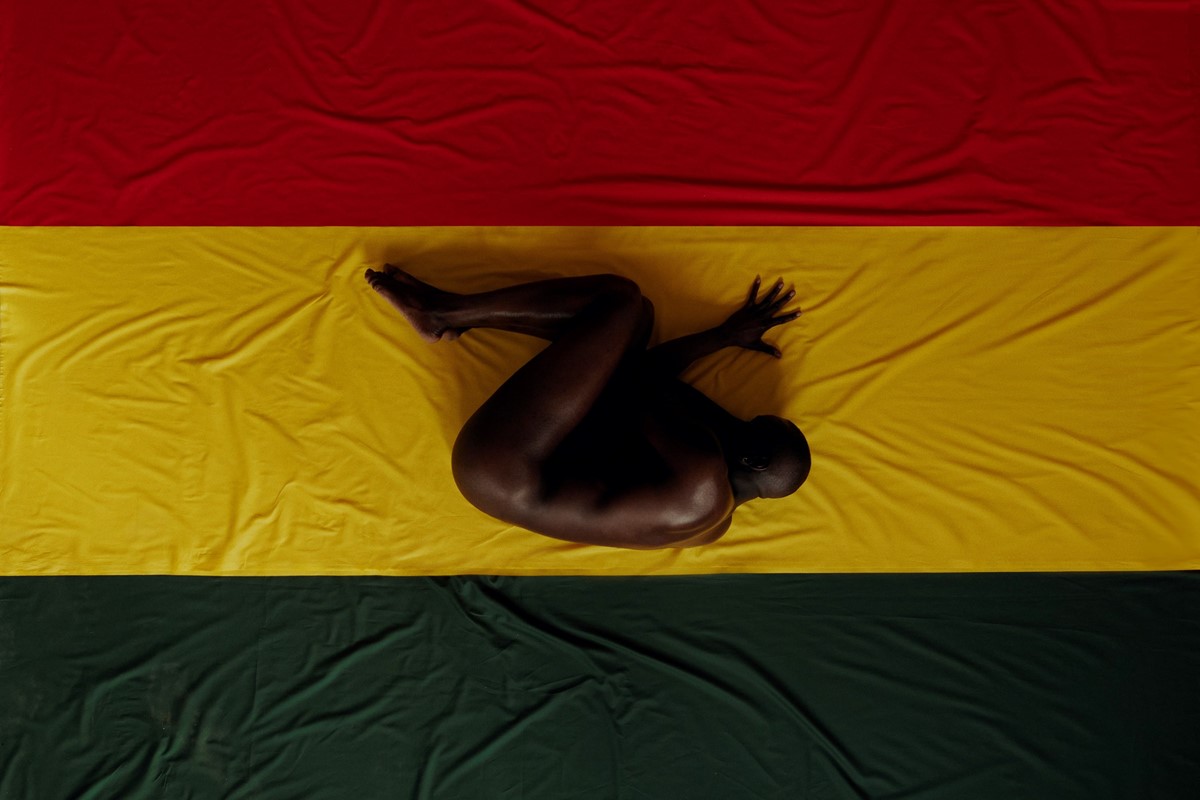
Rewrite
Lead ImageCourtesy of Niijournal
As a self-confessed outsider, Campbell Addy has made it his mission to make space for people who fall outside the lines. The cover of the latest issue of Niijournal is a reimagining of the Ghanaian flag, featuring a lone, Black figure laying recumbent on a red, yellow and green striped backdrop, the figure symbolically replacing the star, which traditionally sits at the centre. “We’re all Black stars in my eyes,” Addy says of the image. The desire to put humanity first is central to Addy’s practice, and is a thread which runs through his cult magazine, Niijournal, which he founded in 2016.
After a five-year hiatus, the print publication is making a highly anticipated return, following three issues with contributions from people like Dazed editor-in-chief Ib Kamara and photographer Tyler Mitchell, who celebrate a plethora of identities and foster a dialogue for alternative notions of Blackness and queer identity. Since the last issue, Addy has continued to carve a space for himself and his collaborators, creating iconic images of well-known figures like Naomi Campbell and Meghan, Duchess of Sussex alongside expanding his practice, showcasing new photography and paintings in the London exhibition I Love Campbell (2023) and producing his first monograph Feeling Seen (2022), published by Prestel.
The impetus for the latest issue of Niijournal, titled Pride? was driven by the parliamentary approval of Ghana’s anti-LGBTQ+ bill earlier this year, which will bring into effect further restrictions on the rights of queer people living in Ghana, criminalising them and those that advocate for them. “I felt so mad when Ghana tried to pass the bill,” says Addy. “In the face of adversity, we’re still going to stand tall. I think a lot of people don’t understand the physical harm that’s going to come to people who are affiliated with the LGBTQ+ community.” With notions of queerness and community at its core, Niijournal IV explores the unique experiences of people around the world, from Salvador, Rio, Japan, Ghana and even the north of England. Embodying Niijournal’s mantra “to educate, not irritate”, this issue also expands beyond the printed page with a series of workshops starting on July 25 in collaboration with Dazed Club.
Below, Campbell Addy talks about the origins of Niijournal, the value of print, and educating the next generation.
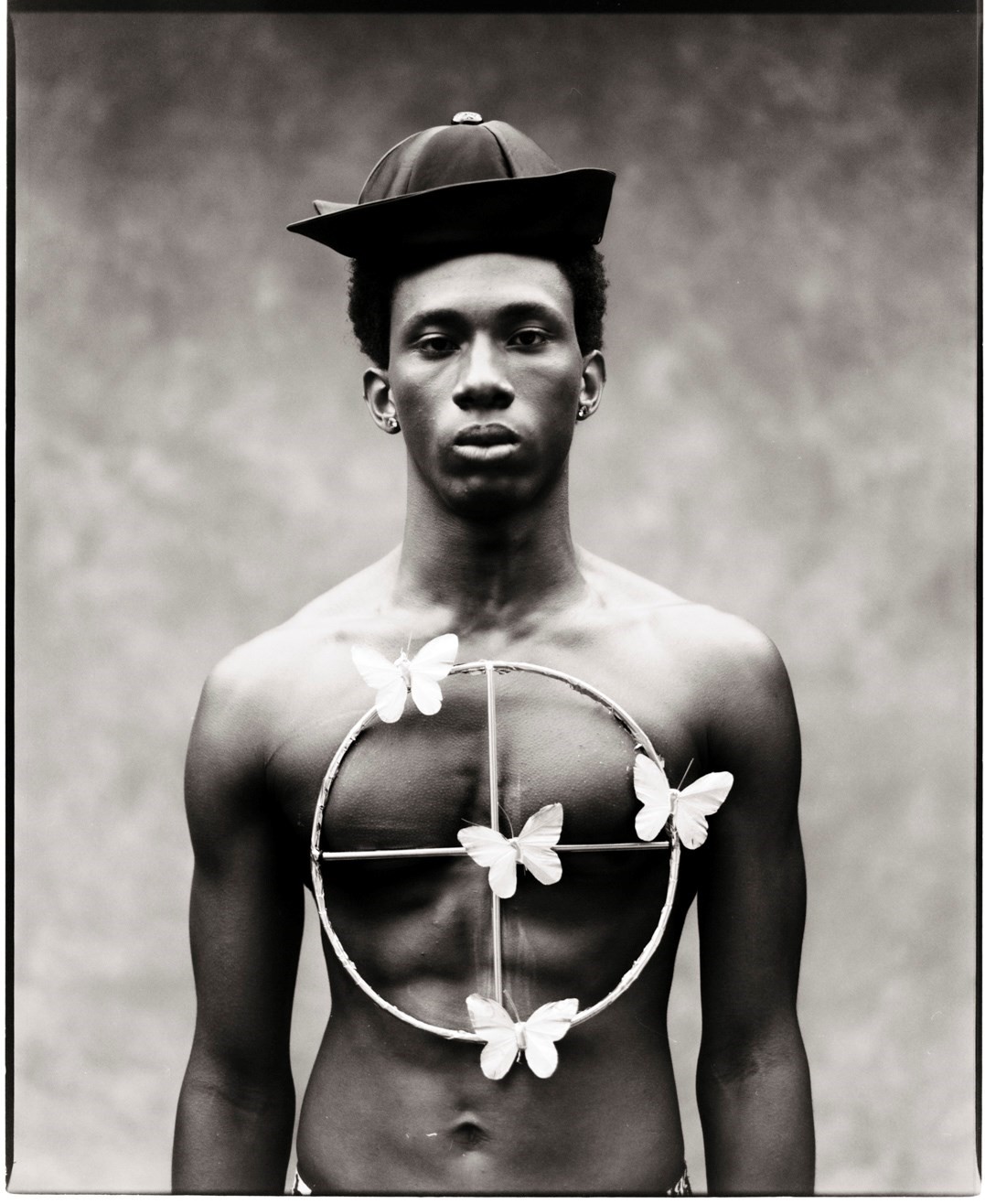
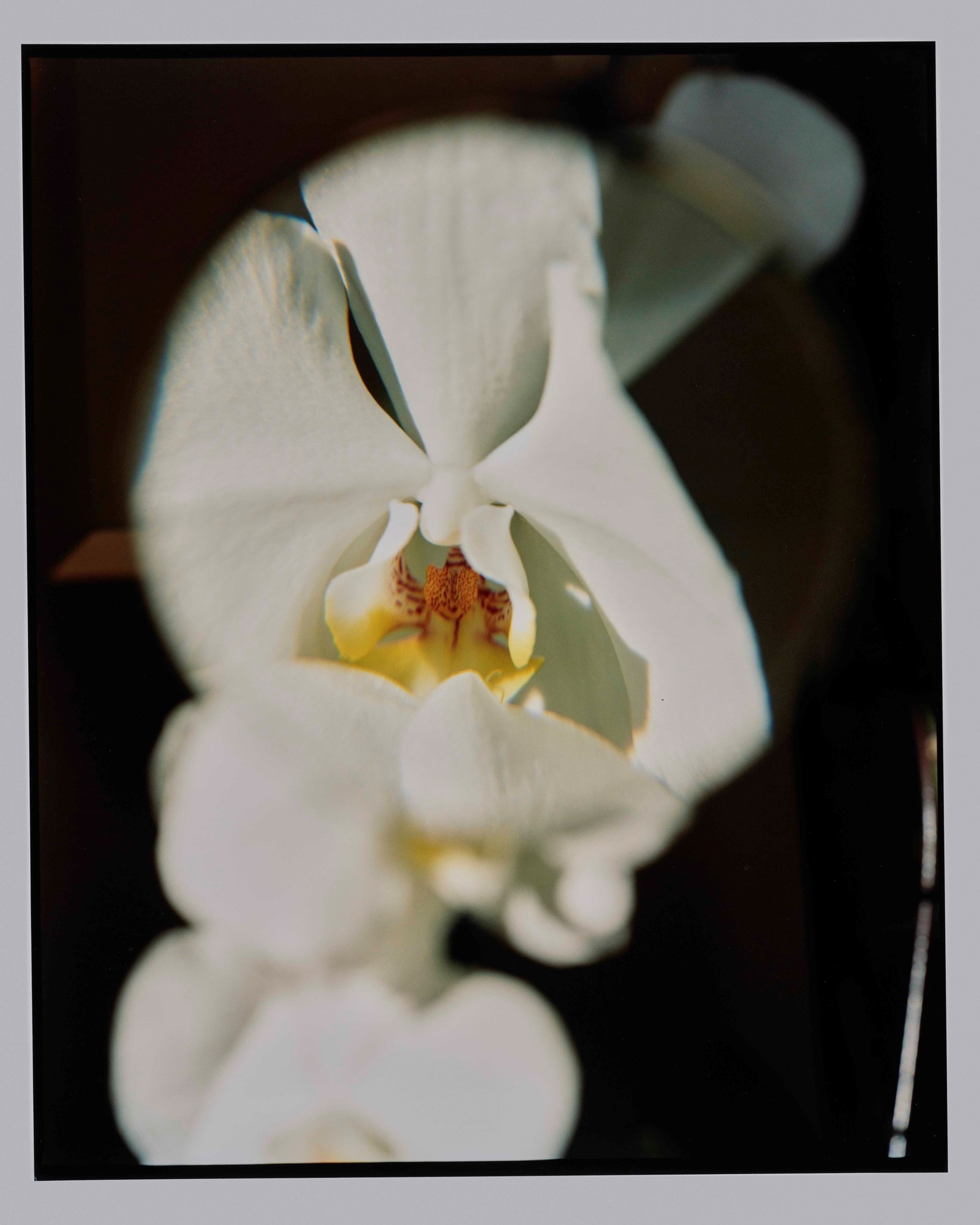
Koye Odejinmi: Your work has played a large role in shifting representation within the industry. Niijournal has highlighted issues of race, gender and sexuality, but what are your overall feelings now, in 2024, about the current state of affairs?
Campbell Addy: When I started Niijournal, I did it because I didn’t see myself or think the work I wanted to create was ‘in’, so I needed to create a space where I could explore the things I wanted to. We have come a long way because there weren’t many Black fashion photographers [then], and now there’s a plethora. However, it’s sometimes one step forward and one step back. I’m not sure what’s happening now, but I feel like the magnifying glass on Black art doesn’t feel as authentic as it was in 2017.
KO: You’ve spoken previously about people expecting you as a Black artist to make a certain type of work.
CA: People are surprised when I have different ideas and they realise that they need to check their unconscious bias. That’s why I think it’s important for me to do Niijournal. A lot of times it’s just having the guts to do something different. When people think, “What’s a Black-owned magazine right now that I read?” and it’s crickets … But how many are there? When I started there were so many, there was gal-dem, Laundry Service, Tyler Mitchell made a publication … there were so many guerrilla-style zines.
“It’s now hard to say I’m just a photographer … I also do other things, it’s almost like I’m editing life” – Campbell Addy
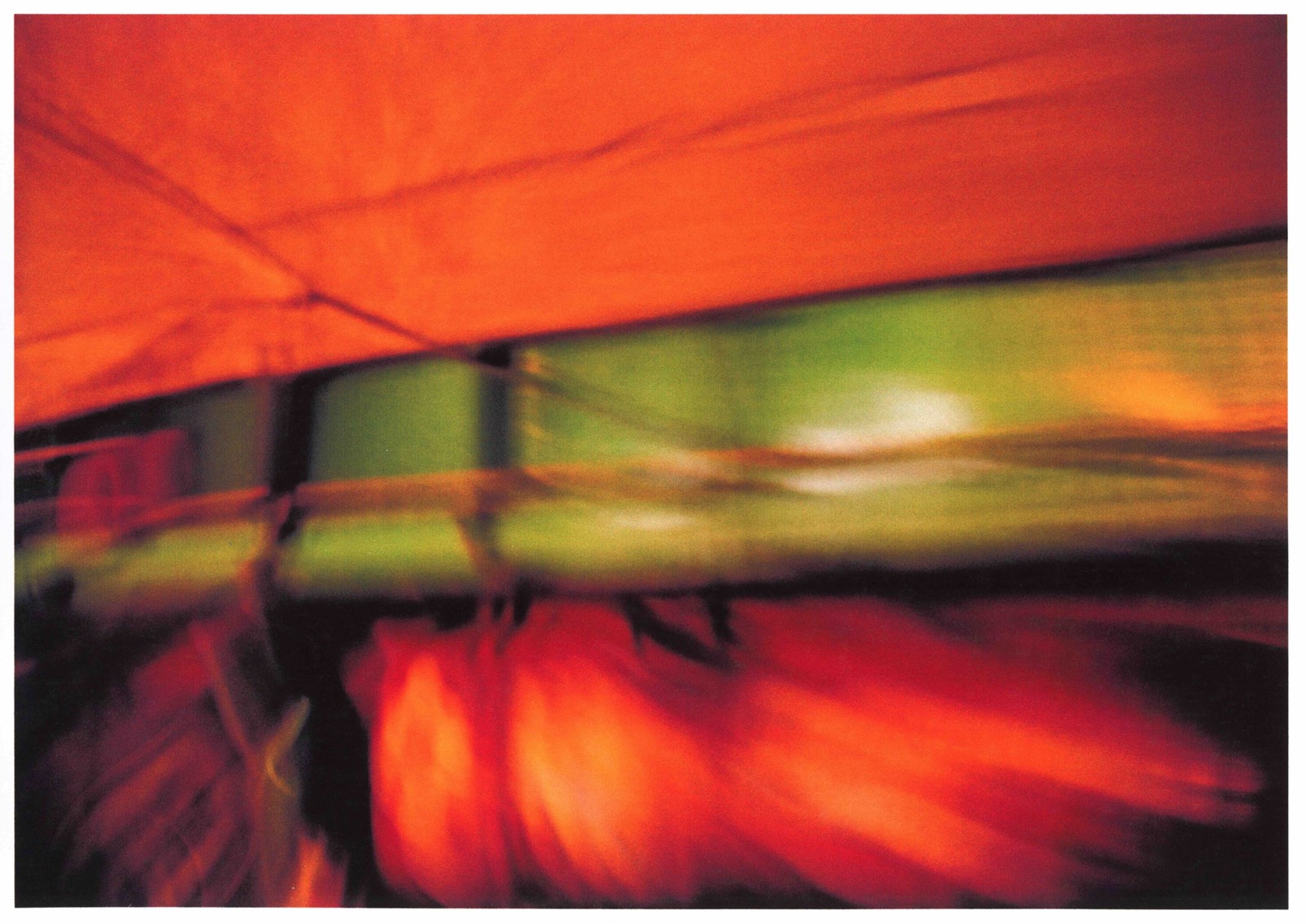
KO: On that thread, we live in a digital age where things seem to come and go so fast. What does print mean to you?
CA: Print means to me what my health means to me – it’s important. It’s something you can’t live without but you have to make it tailored, make it more luxurious in the sense that if I’m spending money on a physical object, it needs to be beautiful, it needs to be an object that I cherish. [With] this issue, everything has changed: the design has changed, the logo has changed – [it’s a] total rebrand. But as a company it’s a whole rebrand as well, Nijournal V I’m already starting. It’s not going to be a magazine, there will be a printed element because I love printed matter, but the reason why it took so long for this last issue to come out was because I was trying to confine the energy of Niijournal to a magazine. If I want it to be a video it will be a video next time, if I want it to be a sculpture, it could be. I’m freer with my work than I was in 2017, so I apply that to everything.
KO: As someone who wears a lot of different hats, how has that influenced the work you’re doing now with Niijournal and the way you collaborate?
CA: It’s now hard to say I’m just a photographer. I’m known for that but I also do other things, it’s almost like I’m editing life. Having worked all these different vocations, it allows me to collaborate with people on a mental level as opposed to a skillset level. Before I used to think, “I’m a photographer so I need a stylist to figure out this image”. Whereas now, the conversations are like “I have this idea, how can we create this?” It shows in my work that I’ve done with Ib Kamara recently, and with Yagamoto.
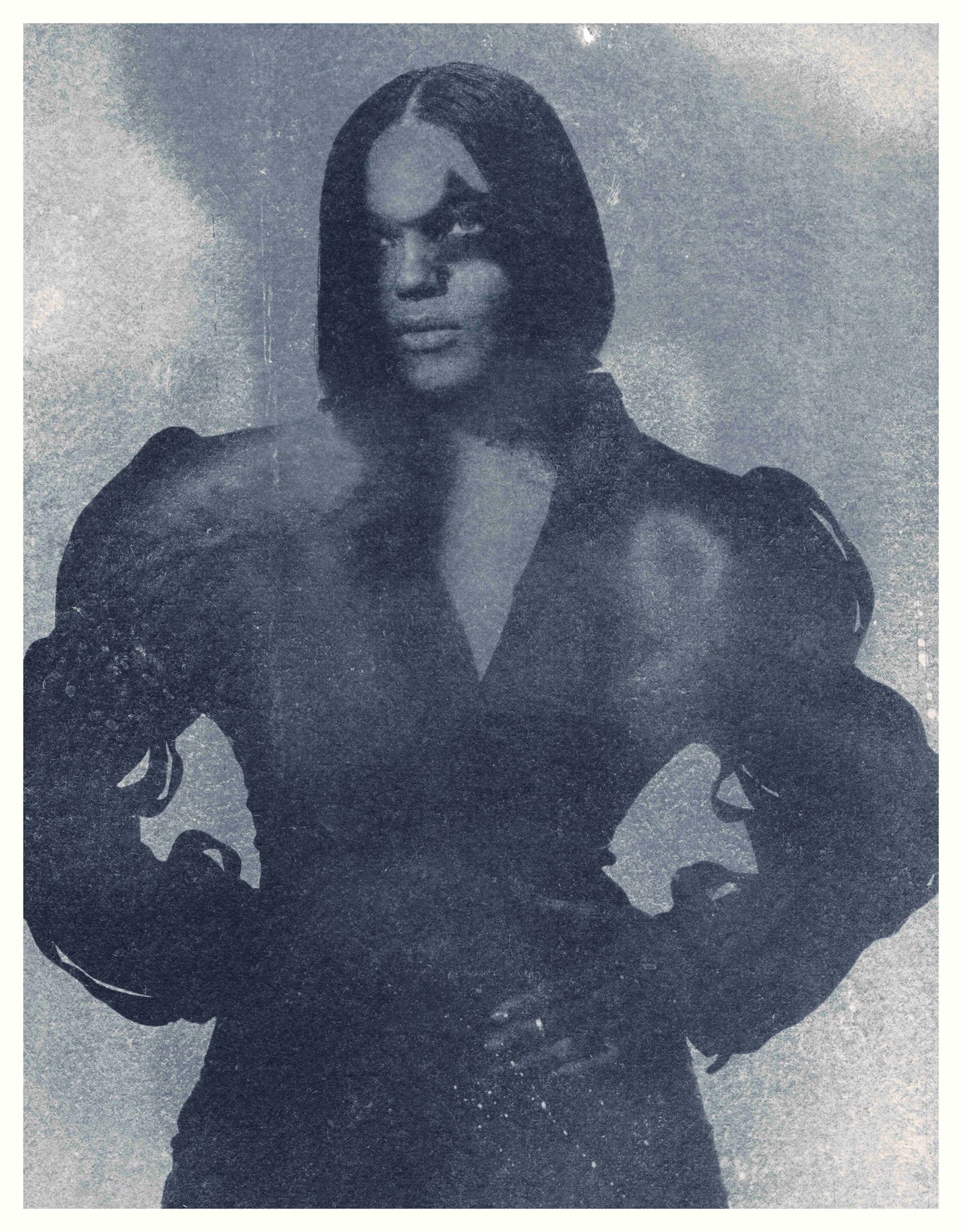
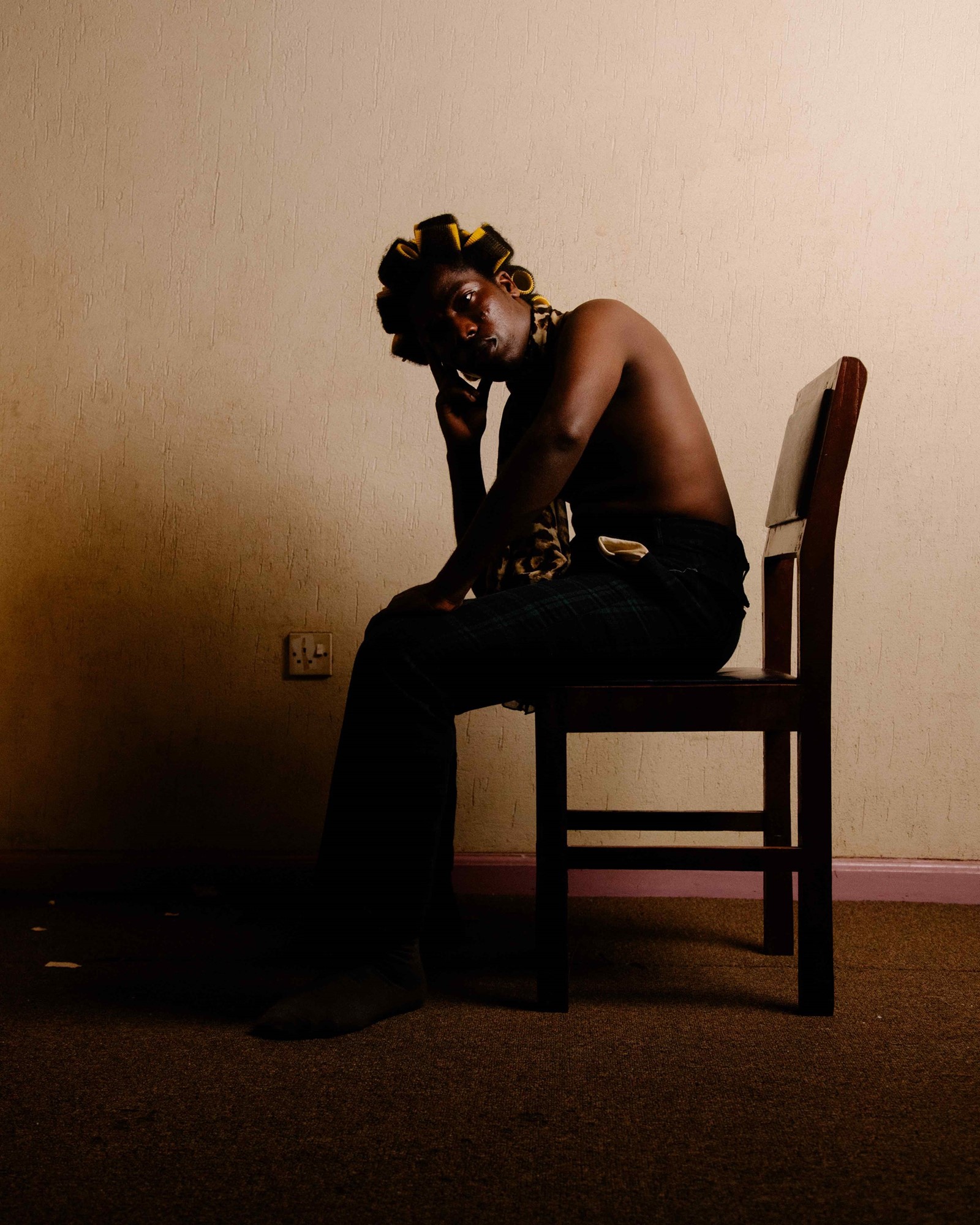
KO: For this issue, you’re expanding Niijournal outside of the printed page – it’s accompanied by a series of workshops and you’ve also worked with Camden Black Creatives Next Gen. Can you speak on the programme you’ve built?
CA: When I started Niijournal, I wanted it to be community-led [from the] inside out, so I teamed up with CBC Next Gen to have six or seven interns, and it was a three-month internship where they came on board for the promotional side of the magazine. My greatest lessons were when I was not even learning how to take a photograph, but producing and learning how to speak with clients, so I wanted the interns to see that back end so they can understand what it takes to put on a show. I wanted to create a space where, not only is my community being fed via the magazine, but we’re also helping the next generation grow. I didn’t have any magazine to intern for that was Black-owned.
KO: You’re also running workshops with Dazed Club?
CA: We also wanted to allow the Niijournal community to experience the ethos of the magazine in different ways. We have a couple of workshops: one with Jamal Khadar, who’s interrogating country music, a panel discussion with myself and a screening with BFI, to name a few. I wanted to touch on elements outside of just photography and fashion and I wanted to bring it to the public. There’s a lot of things I couldn’t put in the magazine – it didn’t make sense for that format – but all of these things make sense as a mini-festival. I’ve never done something like this, but it’s exciting!
Niijournal IV launches on July 26. A two-day event will take place at Dazed Space in London from July 25 – 26. Sign up here.
in HTML format, including tags, to make it appealing and easy to read for Japanese-speaking readers aged 20 to 40 interested in fashion. Organize the content with appropriate headings and subheadings (h1, h2, h3, h4, h5, h6), translating all text, including headings, into Japanese. Retain any existing
tags from
Lead ImageCourtesy of Niijournal
As a self-confessed outsider, Campbell Addy has made it his mission to make space for people who fall outside the lines. The cover of the latest issue of Niijournal is a reimagining of the Ghanaian flag, featuring a lone, Black figure laying recumbent on a red, yellow and green striped backdrop, the figure symbolically replacing the star, which traditionally sits at the centre. “We’re all Black stars in my eyes,” Addy says of the image. The desire to put humanity first is central to Addy’s practice, and is a thread which runs through his cult magazine, Niijournal, which he founded in 2016.
After a five-year hiatus, the print publication is making a highly anticipated return, following three issues with contributions from people like Dazed editor-in-chief Ib Kamara and photographer Tyler Mitchell, who celebrate a plethora of identities and foster a dialogue for alternative notions of Blackness and queer identity. Since the last issue, Addy has continued to carve a space for himself and his collaborators, creating iconic images of well-known figures like Naomi Campbell and Meghan, Duchess of Sussex alongside expanding his practice, showcasing new photography and paintings in the London exhibition I Love Campbell (2023) and producing his first monograph Feeling Seen (2022), published by Prestel.
The impetus for the latest issue of Niijournal, titled Pride? was driven by the parliamentary approval of Ghana’s anti-LGBTQ+ bill earlier this year, which will bring into effect further restrictions on the rights of queer people living in Ghana, criminalising them and those that advocate for them. “I felt so mad when Ghana tried to pass the bill,” says Addy. “In the face of adversity, we’re still going to stand tall. I think a lot of people don’t understand the physical harm that’s going to come to people who are affiliated with the LGBTQ+ community.” With notions of queerness and community at its core, Niijournal IV explores the unique experiences of people around the world, from Salvador, Rio, Japan, Ghana and even the north of England. Embodying Niijournal’s mantra “to educate, not irritate”, this issue also expands beyond the printed page with a series of workshops starting on July 25 in collaboration with Dazed Club.
Below, Campbell Addy talks about the origins of Niijournal, the value of print, and educating the next generation.


Koye Odejinmi: Your work has played a large role in shifting representation within the industry. Niijournal has highlighted issues of race, gender and sexuality, but what are your overall feelings now, in 2024, about the current state of affairs?
Campbell Addy: When I started Niijournal, I did it because I didn’t see myself or think the work I wanted to create was ‘in’, so I needed to create a space where I could explore the things I wanted to. We have come a long way because there weren’t many Black fashion photographers [then], and now there’s a plethora. However, it’s sometimes one step forward and one step back. I’m not sure what’s happening now, but I feel like the magnifying glass on Black art doesn’t feel as authentic as it was in 2017.
KO: You’ve spoken previously about people expecting you as a Black artist to make a certain type of work.
CA: People are surprised when I have different ideas and they realise that they need to check their unconscious bias. That’s why I think it’s important for me to do Niijournal. A lot of times it’s just having the guts to do something different. When people think, “What’s a Black-owned magazine right now that I read?” and it’s crickets … But how many are there? When I started there were so many, there was gal-dem, Laundry Service, Tyler Mitchell made a publication … there were so many guerrilla-style zines.
“It’s now hard to say I’m just a photographer … I also do other things, it’s almost like I’m editing life” – Campbell Addy

KO: On that thread, we live in a digital age where things seem to come and go so fast. What does print mean to you?
CA: Print means to me what my health means to me – it’s important. It’s something you can’t live without but you have to make it tailored, make it more luxurious in the sense that if I’m spending money on a physical object, it needs to be beautiful, it needs to be an object that I cherish. [With] this issue, everything has changed: the design has changed, the logo has changed – [it’s a] total rebrand. But as a company it’s a whole rebrand as well, Nijournal V I’m already starting. It’s not going to be a magazine, there will be a printed element because I love printed matter, but the reason why it took so long for this last issue to come out was because I was trying to confine the energy of Niijournal to a magazine. If I want it to be a video it will be a video next time, if I want it to be a sculpture, it could be. I’m freer with my work than I was in 2017, so I apply that to everything.
KO: As someone who wears a lot of different hats, how has that influenced the work you’re doing now with Niijournal and the way you collaborate?
CA: It’s now hard to say I’m just a photographer. I’m known for that but I also do other things, it’s almost like I’m editing life. Having worked all these different vocations, it allows me to collaborate with people on a mental level as opposed to a skillset level. Before I used to think, “I’m a photographer so I need a stylist to figure out this image”. Whereas now, the conversations are like “I have this idea, how can we create this?” It shows in my work that I’ve done with Ib Kamara recently, and with Yagamoto.


KO: For this issue, you’re expanding Niijournal outside of the printed page – it’s accompanied by a series of workshops and you’ve also worked with Camden Black Creatives Next Gen. Can you speak on the programme you’ve built?
CA: When I started Niijournal, I wanted it to be community-led [from the] inside out, so I teamed up with CBC Next Gen to have six or seven interns, and it was a three-month internship where they came on board for the promotional side of the magazine. My greatest lessons were when I was not even learning how to take a photograph, but producing and learning how to speak with clients, so I wanted the interns to see that back end so they can understand what it takes to put on a show. I wanted to create a space where, not only is my community being fed via the magazine, but we’re also helping the next generation grow. I didn’t have any magazine to intern for that was Black-owned.
KO: You’re also running workshops with Dazed Club?
CA: We also wanted to allow the Niijournal community to experience the ethos of the magazine in different ways. We have a couple of workshops: one with Jamal Khadar, who’s interrogating country music, a panel discussion with myself and a screening with BFI, to name a few. I wanted to touch on elements outside of just photography and fashion and I wanted to bring it to the public. There’s a lot of things I couldn’t put in the magazine – it didn’t make sense for that format – but all of these things make sense as a mini-festival. I’ve never done something like this, but it’s exciting!
Niijournal IV launches on July 26. A two-day event will take place at Dazed Space in London from July 25 – 26. Sign up here.
and integrate them seamlessly into the new content without adding new tags. Ensure the new content is fashion-related, written entirely in Japanese, and approximately 1500 words. Conclude with a “結論” section and a well-formatted “よくある質問” section. Avoid including an introduction or a note explaining the process.


